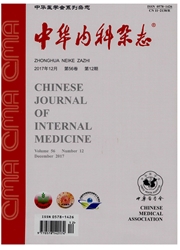

 中文摘要:
中文摘要:
目的 探讨代谢综合征对长程持续性心房颤动(房颤)导管消融成功率的影响.方法 回顾性分析2009年3月至2010年5月人院因持续性房颤初次导管消融的248例患者的临床资料,248例中男197例、女51例,年龄(56±12)岁.房颤持续时间1年以上归为长程持续性房颤组,持续时间短于1年的归为非长程持续性房颤组.结果 248例患者中代谢综合征96例(38.7%),长程持续性房颤130例(52.4%).随访91~1 222(404±303)d,119例(47.9%)复发,代谢综合征组复发率为58.3%,非代谢综合征组复发率为41.4%(P=0.017).长程持续性房颤中代谢综合征患者48例(36.9%),非长程持续性房颤中代谢综合征48例(40.7%),两组代谢综合征的患病率差异无统计学意义(P=0.544).长程持续性房颤代谢综合征组复发率60.4%,非代谢综合征组复发率48.8%(P=0.177);非长程持续性房颤代谢综合征组复发率56.3%,非代谢综合征组复发率32.9%(P=0.033).多因素分析显示,代谢综合征(风险比1.98,95% CI1.04 ~ 3.76,P=0.036)、房颤病程(风险比1.04,95%CI1.01~1.07,P=0.004)是导管消融复发的独立危险因素,长程持续性房颤不是导管消融复发的独立危险因素.结论 代谢综合征影响非长程持续性房颤导管消融成功率,但对长程持续性房颤导管消融成功率无显著影响.
 英文摘要:
英文摘要:
Objective This study sought to explore the impact of metabolic syndrome (MS) on the risk of recurrence after catheter ablation of long-standing persistent atrial fibrillation (AF).Methods Totally 248 patients [197 male,(56 ± 12)years] with persistent AF and catheter ablation were included.Long-standing persistent AF was defined based on the duration (more than one year).Results Among the 248 patients,96 (38.7%) patients had MS,130 (52.4%) patients had long-standing persistent AF.After 91-1222(404 ±303) days follow-up,119 (47.9%) had recurrence.The recurrence rate was significantly higher in the MS group than that in the non-MS group (58.3% vs 41.4%,P =0.017).The proportion of MS was similar between the long-standing persistent AF group and the non-long-standing persistent AF group (36.9% vs 40.7%,P =0.544).Subjects with MS had higher recurrence rate than those without MS in non-long-standing AF group (56.3% vs 32.9%,P =0.033),but not in long-standing AF group (60.4% vs 48.8%,P =0.177).In multivariate analysis,MS (hazard ratio 1.98,95% CI 1.04-3.76,P =0.036) and AF history duration (hazard ratio 1.04,95% CI 1.01-1.07,P =0.004) were independent risk factors for recurrence after catheter ablation of AF.Long-standing persistent AF was not an independent risk factor of recurrence.Conclusion MS was natively associated with the success rate of catheter ablation of AF in patients with non-long-standing persistent AF,but not in patients with long-standing persistent AF.
 同期刊论文项目
同期刊论文项目
 同项目期刊论文
同项目期刊论文
 期刊信息
期刊信息
